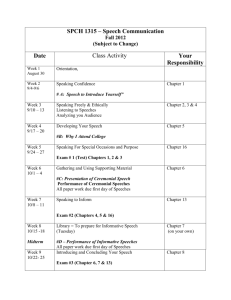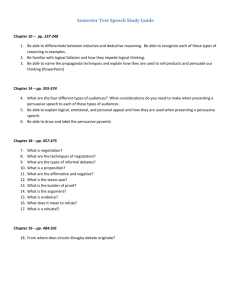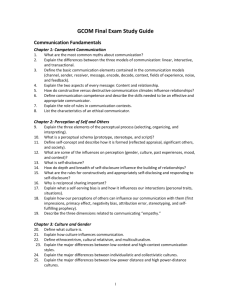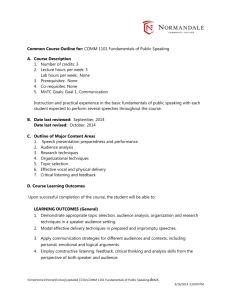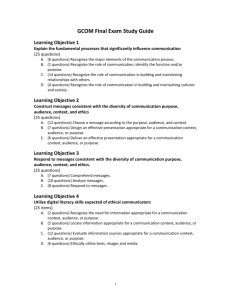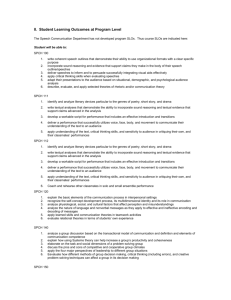LIT LOGO
advertisement
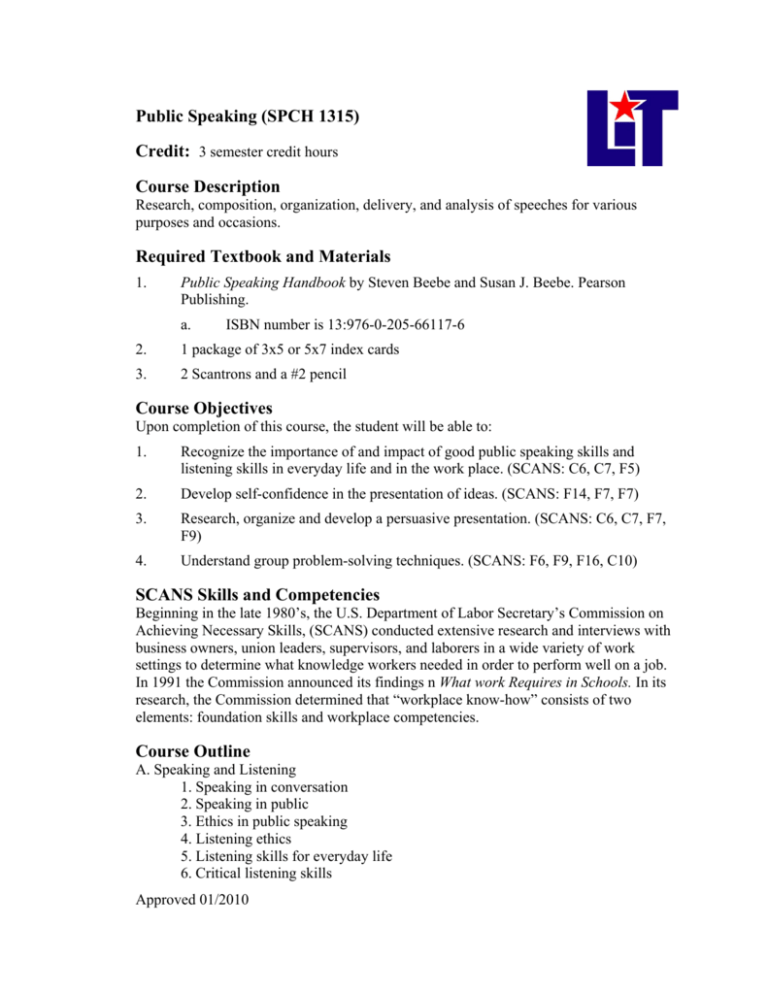
Public Speaking (SPCH 1315) Credit: 3 semester credit hours Course Description Research, composition, organization, delivery, and analysis of speeches for various purposes and occasions. Required Textbook and Materials 1. Public Speaking Handbook by Steven Beebe and Susan J. Beebe. Pearson Publishing. a. ISBN number is 13:976-0-205-66117-6 2. 1 package of 3x5 or 5x7 index cards 3. 2 Scantrons and a #2 pencil Course Objectives Upon completion of this course, the student will be able to: 1. Recognize the importance of and impact of good public speaking skills and listening skills in everyday life and in the work place. (SCANS: C6, C7, F5) 2. Develop self-confidence in the presentation of ideas. (SCANS: F14, F7, F7) 3. Research, organize and develop a persuasive presentation. (SCANS: C6, C7, F7, F9) 4. Understand group problem-solving techniques. (SCANS: F6, F9, F16, C10) SCANS Skills and Competencies Beginning in the late 1980’s, the U.S. Department of Labor Secretary’s Commission on Achieving Necessary Skills, (SCANS) conducted extensive research and interviews with business owners, union leaders, supervisors, and laborers in a wide variety of work settings to determine what knowledge workers needed in order to perform well on a job. In 1991 the Commission announced its findings n What work Requires in Schools. In its research, the Commission determined that “workplace know-how” consists of two elements: foundation skills and workplace competencies. Course Outline A. Speaking and Listening 1. Speaking in conversation 2. Speaking in public 3. Ethics in public speaking 4. Listening ethics 5. Listening skills for everyday life 6. Critical listening skills Approved 01/2010 SPCH 1315 Course Syllabi Spring 2010 B. Speech Preparation 1. Topic selection 2. Audience analysis 3. Research a. Gathering material b. Evaluating material c. Supporting ideas 1) Types of supporting material 2) Proper citation of supporting material d. Organizing the body of the speech e. Beginning and ending the speech f. Outlining the speech 4. Types of speeches a. Informative b. Persuasive c. The speech to entertain C. Presenting the speech 1. The use of language a. Articulation b. Pronunciation 2. Stance a. Posture b. Gestures c. Movement 3. Style a. Pitch b. Volume c. Rate 4. Nonverbal communication a. Eye contact b. Body language c. Use of space d. Tone of voice 5. Methods of delivery a. Manuscript b. Memorized c. Impromptu d. Extemporaneous 6. Visual Aids a. Types of visual aids b. Proper display and handling of visual aids 7. Small group discussion a. Definition of a problem-solving group b. Problem-solving methods for a group c. Group activity 2 SPCH 1315 Course Syllabi Spring 2010 Grade Scale 90 – 100 80 – 89 70 – 79 60 – 69 0 – 59 A B C D F Course Evaluation Final grades will be calculated according to the following criteria: 1. 2. 3. 4. 5. Five Speeches Written Reports Midterm Exam Comprehensive Final Exam Participation in discussion 50% 20% 10% 10% 10% Course Requirements 1. Introductory speech, informative. Students will interview a classmate and introduce them to the audience. 2. Informative speech, general topic of interest to the student and the audience. 3. Informative, instructional 4. Persuasive speech one 5. Persuasive speech two 6. Group discussion 7. Listening Activities (two required) Course Policies 1. No food, drinks, or use of tobacco products in class. 2. Beepers, telephones, headphones, and any other electronic devices must be turned off while in class. 3. The students are responsible for initiating and completing the drop process. Students who stop coming to class and fail to drop the course will earn an ‘F’ in the course. 4. Additional class policies as defined by the individual course instructor. Disabilities Statement The Americans with Disabilities Act of 1992 and Section 504 of the Rehabilitation Act of 1973 are federal anti-discrimination statutes that provide comprehensive civil rights for persons with disabilities. Among other things, these statutes require that all students with documented disabilities be guaranteed a learning environment that provides for reasonable accommodations for their disabilities. If you believe you have a disability 3 SPCH 1315 Course Syllabi Spring 2010 requiring an accommodation, please contact the Special Populations Coordinator at (409) 880-1737 or visit the office in Student Services, Cecil Beeson Building. Course Schedule Week of Week 1 Week 2 Week 3 Week 4 Week 5 Week 6 Week 7 Week 8 Week 9 Week 10 Week 11 Week 12 Week 13 Week 14 Week 15 Week 16 Final Exam Topic Course introduction and policies Pre-test Introduction to Public Speaking MLK Day, no class Jan. 11 Speaking with Confidence Previewing the Audience Centered Speech-Making Process Speaking Freely and Ethically Listening to Speeches Interviews for Speech 1 Finish interviews Speech 1 due Analyzing Your Audience Developing Your Speech Gathering Supporting Material Using Supporting Material Organizing Your Speech Midterm Exam Listening Activity 1 due Introducing Your Speech Concluding Your Speech Speech 2 due Speaking to Inform Designing and Using Presentation Aids Speech 3 due Understanding Principles of Persuasive Speaking Using Persuasive Strategies Speech 4 due Using Words Well: Speaker Language and Style Delivering Your Speech Speech 5 due Appendix A: Speaking in Small Groups Group Discussion practice Extra Credit Speeches Review for Final exam Listening Activity 2 due Final Exams begin Given on the date and time specified by the official exam schedule. 4 SPCH 1315 Course Syllabi Spring 2010 Contact information varies by instructor. 5


